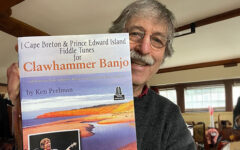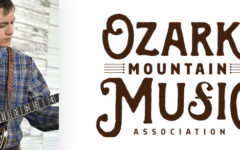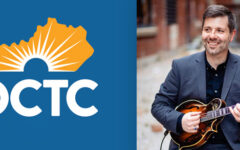 Berklee Today, the quarterly alumni magazine of The Berklee College Of Music, has a feature on the school’s embrace of country, bluegrass and Americana music as part of their instructional program.
Berklee Today, the quarterly alumni magazine of The Berklee College Of Music, has a feature on the school’s embrace of country, bluegrass and Americana music as part of their instructional program.
Written by Christopher John Treacy, and entitled Out Of The Shadows, the article serves as an introduction to the modern acoustic string music scene for the non-initiated, and an explanation of how Berklee developed a instructional program for banjo and mandolin, recently added as principal instruments for study at the college.
“There is no ‘simple music,'” says Professor Dave Hollender, an accomplished bassist and five-string banjo player who also leads Berklee’s bluegrass ensemble. “You can’t learn to properly play bluegrass instruments in three months, six months, or a year. I liken it to the skills required to play classical compositions. I’m troubled by the lack of understanding of what bluegrass really is. O Brother isn’t really bluegrass, and what Alison Krauss does isn’t really bluegrass. But if these pop hybrids get people interested in investigating further, that’s fantastic.” True bluegrass is a gritty, rustic musical sport requiring an instrumental mastery that many nonmusicians find surprising. That said, it’s not nearly as big a stretch as one might assume to include bluegrass and related hybrids in a curriculum that built its reputation by incubating jazz dynamos.
The piece also discusses Boston’s emergence as an epicenter for young, progressive string musicians, and how the school has given a further nod in the direction of Americana music by appointing Mark Simos, a recognized old time musician and songwriter, to the Berklee Songwriting Department.
Read the full article online.
UPDATE 2:55 p.m. Dave Hollender asked that we include this comment, feeling that his quote in the original Berklee Today article was subject to misinterpretation.
“I’m afraid that the quote attributed to me isn’t what I actually said. I’d like to clarify. I pointed out that although SOME of Alison Krauss’ music is not what purists would consider bluegrass, I don’t really care. Clearly a lot of her music is bluegrass and either way, I happen to like most all of it. If new listeners are not completely knowledgeable about the music when they first discover it, that’s only to be expected. Eventually they will learn about the roots of the music and various sub-styles.
Thanks again for covering what we a are doing at Berklee.”







